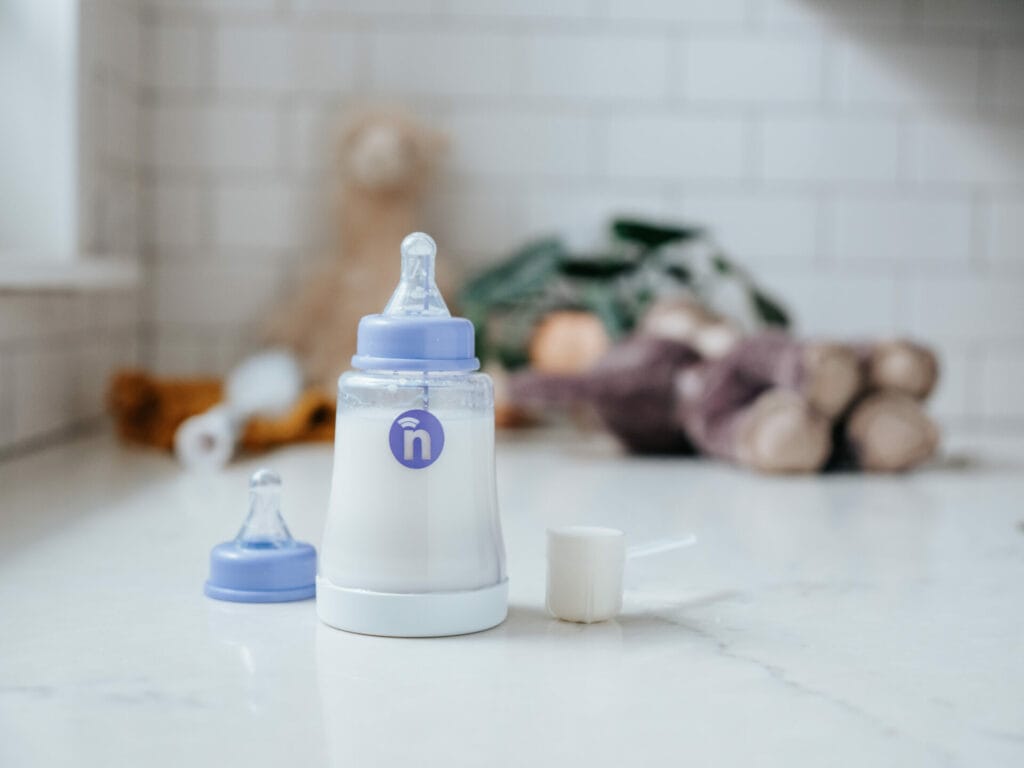Why is my baby spitting up?
Last updated on January 3, 2023


You’ve just fed your baby breast milk or formula, only to watch him or her spit up what seems like the entirety of that precious meal. It’s not the first time, and you’re pretty sure it’s not the last. Spitting up is messy, confusing, and it might even be making you wonder if your little one is receiving enough nutrition. What is going on?
Spitting up is a common occurrence in healthy babies. In fact, during their first three months, about half of all babies experience their stomach contents coming back up into the esophagus. In most cases, spitting up is harmless and resolves on its own as the baby’s digestive system matures. However, if it becomes frequent, excessive, or accompanied by other symptoms such as poor weight gain or irritability, it is advisable to consult a healthcare professional.
Here are a few of the reasons spitting up occurs:
Immature digestive system: In the early months, a baby’s digestive system is still developing and may not be fully able to handle and process food. The muscle at the top of the stomach, called the lower esophageal sphincter, is not fully developed in infants, leading to the regurgitation of milk or formula. Additionally, a baby’s esophagus is shorter and more horizontal than the esophagus of a toddler, for example, making it easier for stomach contents to flow back up.
Overfeeding: If a baby is fed too much or too quickly, their stomach may become overly full, leading to spit-up.
Gastroesophageal reflux (GER): GER occurs when the contents of the stomach flow back into the esophagus. It is a common condition in infants and can cause spitting up. Most cases of GER resolve on their own as the baby grows.
Food intolerance or allergy: Sometimes, babies may have difficulty digesting certain proteins found in formula or breast milk, leading to spitting up. In some cases, this may be due to a food allergy or intolerance.
Improper feeding technique: If a baby is not positioned correctly during feeding or if the bottle nipple or breastfeeding latch is incorrect, they may swallow air along with the milk, leading to spitting up.
Teething: When babies start teething, they may produce more saliva, which can increase the likelihood of spitting up.
It’s important to note that occasional spit-up is generally not a cause for concern, especially if your baby is otherwise healthy, gaining weight, and not showing signs of discomfort. However, if your baby is consistently spitting up large amounts, projectile vomiting, experiencing weight loss, or showing signs of distress, it is advisable to consult a healthcare professional for a proper evaluation.
How do I know which of these reasons is the cause?
Determining the exact cause of your baby’s spitting up can sometimes be challenging, as there can be multiple factors involved. However, by observing your baby’s behavior and discussing the symptoms with a healthcare professional, you can gain a better understanding of the possible causes. Here are some steps you can take to help identify the cause:
Observe feeding patterns: Pay attention to how your baby feeds. Is your little one eating too quickly or taking in large volumes? Consider adjusting the feeding technique, such as using smaller, more frequent feedings, burping your baby during and after feeds, and ensuring they are in an upright position during feeding.
Rule out overfeeding: Work with your healthcare professional to determine the appropriate amount of milk or formula for your baby’s age and weight. Make sure you are following the recommended guidelines for feeding.
Monitor your baby’s behavior: Take note of any additional symptoms or patterns associated with the spitting up. Does your baby seem uncomfortable or in pain? Are there specific triggers, such as certain foods or positions? Documenting these observations can provide useful information for your healthcare provider.
Consider possible allergies or intolerances: If you suspect a food allergy or intolerance, you can try eliminating certain foods from your diet (if you’re breastfeeding) or switching to a hypoallergenic formula (under the guidance of a healthcare professional) to see if the spitting up improves. Your doctor may also recommend specific tests or evaluations to identify any underlying allergies or intolerances.
Consult a healthcare professional: If your baby’s spitting up is frequent, forceful, accompanied by other symptoms like poor weight gain, or causing significant distress, it is important to consult your pediatrician or a healthcare professional. They can assess your baby’s overall health, review the feeding habits, and may recommend additional tests or investigations if needed.
Remember, every baby is unique, and what works for one may not work for another. By working closely with your healthcare professional and sharing your observations, you can receive appropriate guidance to help determine the cause of your baby’s spitting up and ensure their well-being.
How can I help prevent or minimize spit up?
Here are some strategies that might help to minimize the occurrence or reduce the amount of spit-up your baby is experiencing.
- Ensure that you are using proper feeding techniques. Hold your baby in an upright position while feeding, and burp them frequently during and after meals. This can help release any trapped air and prevent excessive air swallowing, which can contribute to spitting up.
- Pace feedings. If your baby tends to eat too quickly, try paced feeding. This involves slowing down the feeding process by allowing your baby to take breaks and rest during the feeding session. You can pause the feeding every few minutes and burp your baby before resuming.
- Offer smaller, more frequent feedings. This can help prevent your baby’s stomach from becoming overly full, reducing the likelihood of spitting up. Talk to your healthcare provider about an appropriate feeding schedule and portion size for your baby’s age and needs.
- Keep your baby upright for about 30 minutes after a feeding. This can help prevent stomach contents from flowing back into the esophagus.
- Avoid overfeeding. Sometimes, babies may continue to suck even when they are no longer hungry, leading to overfeeding and increased spitting up, so try to be mindful of your baby’s cues. (You can learn more about cue-based feeding here.)
- Monitor your own diet: If you’re breastfeeding, certain foods or beverages in your diet could potentially contribute to increased spitting up or digestive discomfort in your baby. Common culprits include spicy or acidic foods, caffeine, dairy products, or gas-inducing foods like cabbage or beans. Try eliminating suspected foods one at a time to see if it makes a difference.
Remember, every baby is different, and what works for one may not work for another. It’s essential to consult with your pediatrician or a healthcare professional who can provide personalized guidance based on your baby’s specific needs and circumstances.


Reviewed by Dr. Gilson Capilouto & Dr. Jessie Zak
Next Article

